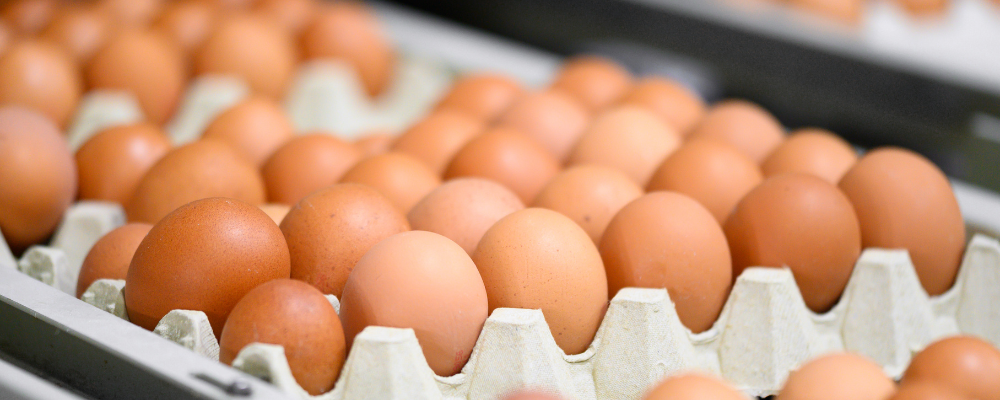BACKGROUND
In the early years of the 20th century, egg production was largely a sideline to other farming operations and there were few specialist egg producers. This meant that prices were subject to sharp fluctuations and there was strong competition from overseas. UK egg producers wanted to differentiate their product from that of other countries and encourage the public to buy British.
1928
The National Mark Scheme
In 1928, the Government and the Farmers’ Union set up a voluntary scheme to try to provide a quality guarantee for a range of home-produced goods, including eggs. The ‘National Mark Scheme’ was the first organised attempt to provide the market with reliably-graded, high quality, home-produced eggs.
1939-1945
World War II
During the war, foodstuffs such as eggs were rationed to ensure everyone received their fair share, and consumers were given vouchers which they used to buy eggs. A new organisation, the National Egg Distributors’ Association Limited (NEDAL) was set up to supply eggs. As the war progressed, a shortage of animal feed meant that the number of hens declined, forcing egg rationing to remain in place until 1953.
1957-1971
British Egg Marketing Board
The British Egg Marketing Board was set up with the aim of bringing stability to the market so that egg producers could get the best possible returns and consumers could be provided with a regular supply of high quality, home-produced eggs at reasonable prices. The BEMB obtained its funds from three sources: egg sales, Government subsidy and income from taxes which egg producers had to pay.
Under the BEMB, ‘first quality’ eggs were required by law to be stamped to show their grade and with a number that could be used to locate the packing station from which the eggs originated. To this, the BEMB added its own trademark – a Lion. The ‘Little Lion’ became a well-known symbol, popular with consumers, and appeared regularly on advertising and promotional material throughout the BEMB’s lifetime. British egg producers with more than 50 hens had to be registered, and the BEMB was obliged to accept for sale all eggs offered to it.
The Board took the following steps to help promote British eggs:
- Operated a national price structure
- Disposed of surpluses by processing them into egg products (such as dried egg, used in food manufacture)
- Helped distribution by movement of regional surpluses
- Ensured national quality standards for packing stations
- Promoted the sale of British eggs through national advertising, sales promotion and public relations.
The advertising slogan “Go to Work on an Egg” was introduced and featured on TV ads with comedian Tony Hancock. The slogan developed into one of the most popular and memorable advertising campaigns of all time. Advertising and other BEMB activities saw egg consumption increase by about 14 per cent between 1957 and 1970.
In later years a problem arose as improved methods of production meant that yields (the number of eggs per bird) began to increase. Although the BEMB was obliged to buy all eggs offered to it, producers were allowed to sell their eggs elsewhere – and the Board became a ‘dumping ground’ for the eggs which producers could not sell elsewhere.
The Government removed the requirement to stamp eggs in 1968.
1971-1986
Eggs Authority
The BEMB was replaced by the Eggs Authority in 1971 and under this new direction, producers had to find their own markets. The Lion symbol was also dropped at this time. The Authority’s main objective was to support British egg producers by positioning eggs as an acceptable food in contemporary society. The Authority’s activities included advertising with slogans such as “Crack a Meal Today”, “Thank Goodness For Eggs”, “Go Smash an Egg” and “The Egg Lover”. At the same time, research was conducted and the issues of diet and health were raised, particularly that of cholesterol intake, and new processed egg products were developed for the catering and consumer markets.
Despite these promotional campaigns, however, egg consumption declined during the 1970s and 80s due to changing consumer lifestyles, including a decline in cooked breakfasts and home baking.
In 1973, the UK entered the European Economic Community and British eggs became subject to the EEC Egg Marketing Regulations governing quality, grade-sizing, labelling and packaging.
In 1985 the Eggs Authority was reviewed by the government. The review uncovered a lack of support from the egg industry itself, and the Authority was abolished in 1986, replaced by the British Egg Industry Council, a voluntary organisation.
1986–PRESENT DAY
British Egg Industry Council (BEIC)
The BEIC was established in 1986; is funded by voluntary contributions from egg producers and packers and is made up of the major trade associations from the different subdivisions and geographical regions of the UK industry.
In 1997, a Salmonella Enteritidis vaccine is used for the first time in commercial egg layers. The following year, the British Lion Code of Practice is launched, requiring compulsory Salmonella vaccination for the first time.
Lion launches a £4 million television advertising campaign for Lion eggs in 1999 and in 2000 BEIC reintroduces the Lion Quality mark including best before date onto shells of all Lion eggs.
From 2004, producers in the UK were required by law to mark their eggs with a Producer Establishment Number, showing the system of production, country of origin and their unique farm ID for traceability purposes.
In 2012, battery cages were banned in the UK.
British Lion eggs go from strength to strength, continually improving standards. In 2017, the Food Standards Agency changed its advice to say that pregnant women and vulnerable groups could safely eat ‘runny eggs’ if they were British Lion – this endorsement of a farm assurance scheme was the first of its kind.
In 2023, BEIC launches Version 8 of the Lion Code of Practice.
